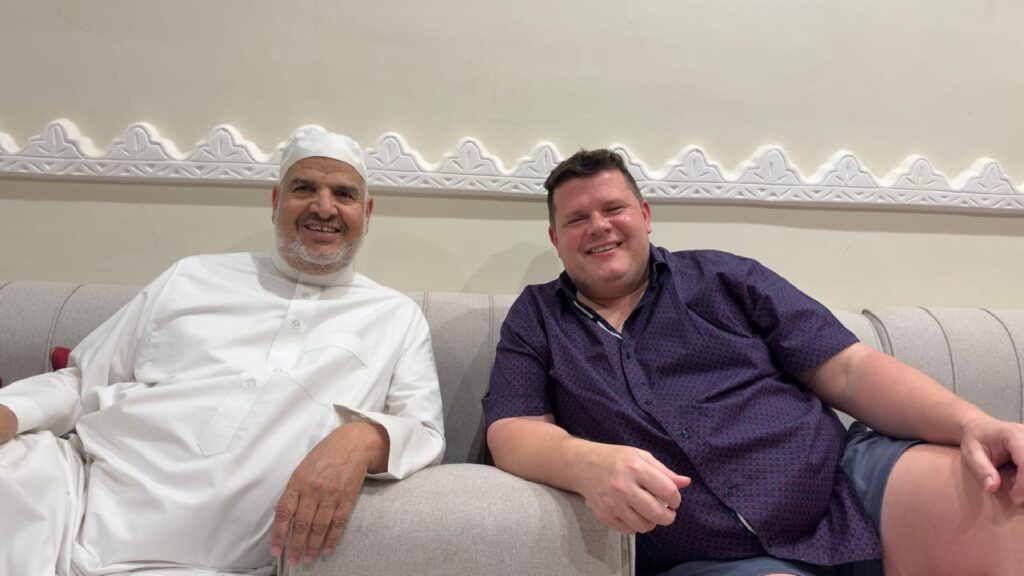From Village to Vision: A Teacher’s Reflection on Change and Education in Saudi Arabia
I recently had the privilege of sitting down with Mr. Ibrahim AlSaif, a retired primary school teacher who taught in Irqah, a neighborhood of Riyadh for 36 years. Our meeting wasn’t just a formal interview—it was a heartfelt conversation shared over an iftar meal with his family during Ramadan. I’ve been friends with his family for years, and this was the perfect time to reflect on the transformation of Riyadh and the evolution of education in Saudi Arabia.
As we sat together, surrounded by the warmth of his family, I listened to him speak about his journey—from a small village with no electricity to becoming an educator in Riyadh, where he moved in the 1960s. His story is one of perseverance, patience, and a deep commitment to knowledge. Through his eyes, I saw how much Saudi Arabia has changed—and how some values remain timeless.
Life in the Village: Learning Without Lights
Mr. Ibrahim grew up in As Sufurrat, a remote village where basic amenities were scarce. “We had no electricity, no proper schools,” he told me, recalling how difficult it was to get an education. Yet, despite these challenges, learning was always his top priority. He described how he would study for hours by candlelight, determined to succeed no matter the obstacles.
His story is a stark contrast to today, where students have access to digital tools, online courses, and government-supported education initiatives. Yet, as he emphasized, success still depends on the same core values: patience, discipline, and hard work.
“Now is the time for knowledge,” he told me—a message that resonates even more in today’s fast-changing world.
From Dirt Roads to Development
When asked about how much Riyadh has changed, Mr. Ibrahim shook his head with amazement. “Everything has changed,” he said, almost in disbelief.
His village, once without electricity or shops, has evolved into a thriving community with paved roads, markets, and better schools. Young people today have more opportunities than ever, but he also pointed out that with modernization comes the need for a new mindset.
The shift from an agricultural-based lifestyle to a knowledge-driven economy has been one of the biggest changes. In the past, most families relied on farming or manual labor to survive. Today, university degrees and specialized skills are the key to financial stability.
Lessons from the Classroom: The Power of Education
With over three decades in the classroom, Mr. Ibrahim has seen firsthand how education has shaped generations. He remembers a time when students would often drop out to help their families, but now, thanks to government initiatives, more young people are continuing their education and finding professional careers.
But learning today is more than just attending school. He stressed that students must embrace technology and think critically about their future.
“It’s no longer enough to just work hard,” he explained. “You have to work smart.”
Opportunities today are limitless—from online courses to specialized training programs—but only for those willing to take advantage of them.
Advice for Future Generations: Embrace Change and Stay Patient
When I asked what advice he would give to today’s youth, Mr. Ibrahim’s response was simple but powerful:
- Be patient. Success doesn’t happen overnight, but dedication pays off.
- Work hard. Even with modern tools, effort and commitment are essential.
- Embrace technology. The future belongs to those who adapt and innovate.
- Don’t rely on the past. Traditional ways of life may not provide financial security in today’s economy.
His words serve as both encouragement and a warning—opportunities today are greater than ever, but they require responsibility and determination.
Conclusion: A New Era, A New Responsibility
As we finished our conversation, I reflected on how much Saudi Arabia’s transformation is about people, not just progress. Individuals like Mr. Ibrahim have lived through these incredible changes and now pass their wisdom on to the next generation.
His journey—from a village without electricity to teaching in one of the fastest-growing cities in the world—is a testament to the power of education, perseverance, and adaptability.
Saudi Arabia is moving forward rapidly, and for its youth, the challenge is clear: take advantage of the opportunities available, embrace lifelong learning, and build a future where knowledge is the foundation of success.
